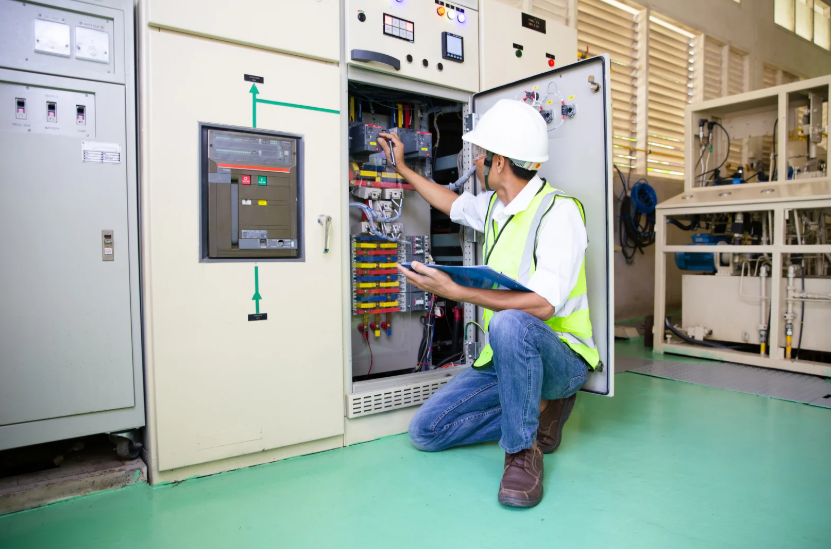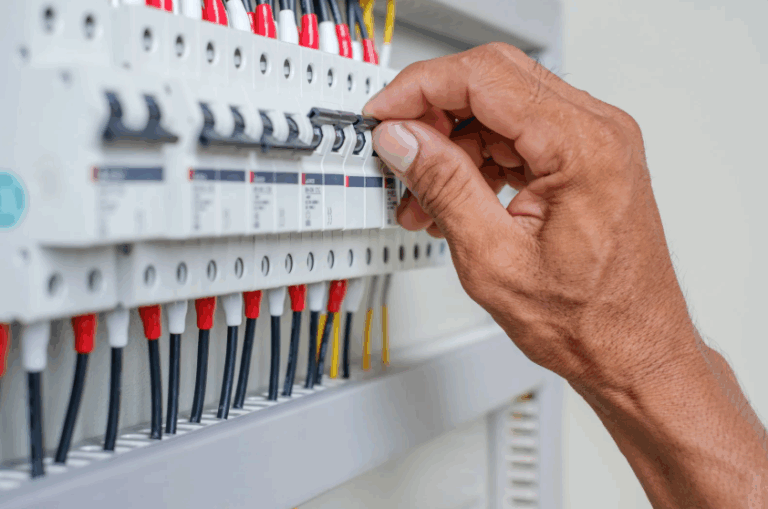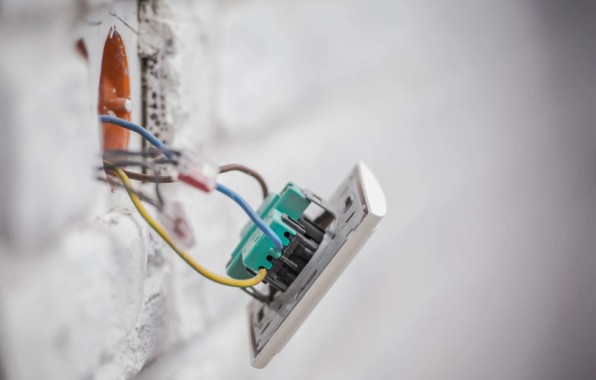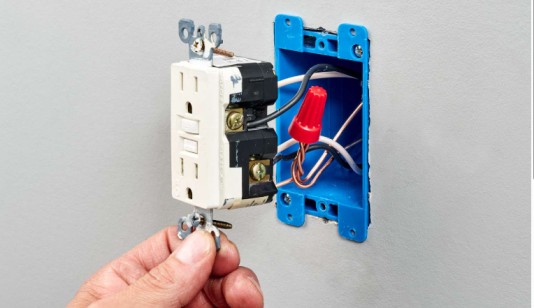If your circuit breaker tripping, makes a popping sound, or you think it’s blown, you’re not alone. This is one of the most common electrical issues for homeowners in Scarborough and the GTA.
Quick answer:
- Most breaker trips happen due to circuit overloads, short circuits, or ground faults.
- Popping sounds often mean arcing or a sudden fault inside the breaker.
- “Blown” breakers are often a misunderstanding — they don’t “blow” like fuses, but they can wear out.
Safety note: If your breaker trips immediately after reset, stop and call a licensed electrician. This could be a sign of a dangerous fault.
Tripping vs Popping vs Blowing – Are They the Same Thing?
| Term | What It Means | Common Cause | Typical Fix |
| Tripping | Breaker switch flips to the OFF position automatically | Overload, short circuit, ground fault | Unplug devices, balance load, repair fault |
| Popping | Audible snap or crack at breaker box | Arc fault, internal breaker failure | Replace breaker, fix wiring issue |
| Blowing | Often confused with fuses — breaker stops working completely | Worn-out breaker or internal damage | Replace with a new breaker |
Why it matters: Understanding the difference helps you explain the problem to an electrician and speeds up troubleshooting.
12+ Most Common Reasons Your Breaker Keeps Tripping (With Fixes)
1. Circuit Overload
When too many devices run on the same circuit, the breaker trips to prevent overheating.
Fix:
- Unplug non-essential devices on that circuit.
- Move high-demand appliances to separate outlets.
- Consider upgrading to a higher-capacity circuit.
2. Short Circuit
A hot wire touches a neutral or ground wire, creating a dangerous spike in current.
Fix:
- Turn off power immediately.
- Inspect for damaged cords or outlets.
- Call a licensed electrician — short circuits can cause fires.
3. Ground Fault
Occurs when electricity flows into the ground unexpectedly, often in damp areas.
Fix:
- Unplug and inspect devices in kitchens, bathrooms, or outdoors.
- Upgrade to GFCI protection.
- Repair any water-damaged wiring.
4. Overheating Appliance
Old or faulty appliances can overheat and trip breakers.
Fix:
- Stop using the appliance.
- Test on another circuit — if it still trips, replace or repair it.
5. Faulty Appliance
Appliances with internal shorts can overload circuits instantly.
Fix:
- Use a multimeter to test resistance.
- Replace damaged devices.
6. Worn-Out Breaker
Breakers have moving parts that wear down over years of use.
Fix:
- Replace with a new breaker of the same rating.
- Only allow a licensed electrician to perform replacement.
7. Arc Fault
A damaged wire or loose connection causes electricity to “jump” between contacts.
Fix:
- Install an AFCI breaker.
- Repair or replace damaged wiring.
8. Power Surges
Sudden spikes in voltage can trip sensitive breakers.
Fix:
- Install whole-home surge protection.
- Check the grounding system.
9. Outdated Wiring
Old aluminum or cloth wiring may not meet current safety standards.
Fix:
- Schedule an electrical inspection.
- Replace with modern copper wiring.
10. Loose Wiring
Loose terminal screws can cause heat build-up and breaker trips.
Fix:
- Tighten connections (electrician only).
11. Environmental Issues
Humidity, rodents, or corrosion can cause electrical faults.
Fix:
- Seal entry points.
- Use moisture-resistant wiring where needed.
12. Breaker Misuse
Some people repeatedly reset a breaker without addressing the cause.
Fix:
- Identify and fix the root problem before resetting.
Safe Troubleshooting Before Calling an Electrician
- Turn off the main breaker.
- Unplug all devices on the affected circuit.
- Reset the breaker once.
- If it trips immediately again, stop and call a licensed electrician.
⚠ Warning: Never open a breaker panel unless you are qualified.
How to Prevent Future Breaker Trips
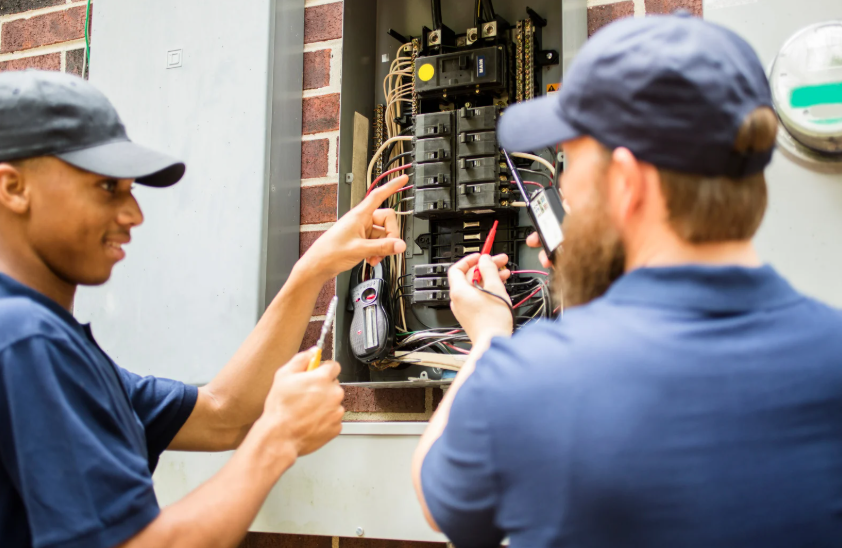
- Balance electrical load between circuits.
- Install dedicated circuits for high-power appliances.
- Upgrade to AFCI/GFCI protection where needed.
- Schedule annual inspections with a licensed electrician.
Conclusion – Don’t Ignore the Warning Signs
A tripping breaker is a sign your electrical system is protecting you from danger, but it’s also a warning. Whether it’s an overload, faulty appliance, or wiring issue, Nura Electric can diagnose and fix the problem the same day.
FAQs
Can I replace a circuit breaker myself?
Replacing a circuit breaker should only be done by a licensed electrician to ensure safety and compliance with local regulations.
Why does my breaker trip even when nothing is plugged in?
This could be due to a wiring issue or an aging breaker that trips without load. In such cases, it’s best to have a professional inspect your system.
Why does my breaker trip when I plug in my heater?
Heaters draw high current and can overload the circuit. Use a dedicated outlet and avoid running other devices on the same line.
How often should I have my electrical system inspected?
For optimal safety, it’s recommended to have your electrical system inspected every 5-10 years, or sooner if you experience frequent electrical issues.

